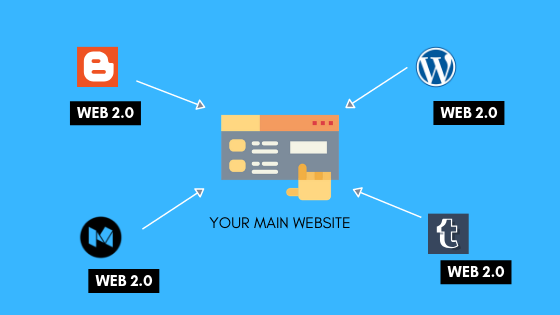In the ever-evolving landscape of digital marketing, SEO (Search Engine Optimization) remains a critical component of online visibility and success. Web 2.0 blogs offer a dynamic platform for businesses and individuals looking to enhance their online presence. However, with the benefits come potential pitfalls, including the risk of facing penalties from search engines like Google. Understanding how to navigate this terrain can help marketers leverage Web 2.0 blogs effectively while minimizing risks. Here’s a guide on how to use Web 2.0 blogs for SEO without falling victim to penalties.
What Are Web 2.0 Blogs?
Web 2.0 blogs are user-generated content platforms that allow users to create and share content easily. Unlike traditional websites, these platforms facilitate interaction and collaboration, making it possible to engage with audiences more effectively. Popular examples include Blogger, WordPress.com, Tumblr, and Medium. While these platforms can enhance your SEO strategy, they require careful management to avoid penalties.
Common Pitfalls Leading to Penalties
Before diving into strategies for using Web 2.0 blogs effectively, it’s essential to understand the common pitfalls that may lead to penalties:
-
Low-Quality Content: Search engines prioritize high-quality, original content. Copy-pasting or using spun content can significantly lower your ranking.
-
Keyword Stuffing: Overusing keywords in an unnatural manner not only disrupts the reading experience but can also lead to penalties for “keyword stuffing.”
-
Lack of Engagement: If your blog does not encourage interaction or fails to engage users, it could be flagged as low-value content.
-
Spammy Links: Building backlinks from low-quality, irrelevant websites can harm your site’s authority and may result in penalties.
- Neglecting Mobile Optimization: With a growing number of users accessing content on mobile devices, failing to optimize for mobile can affect user experience and search rankings.
Strategies for Avoiding Penalties
1. Focus on High-Quality Content Creation
The foundation of a successful Web 2.0 blog lies in producing high-quality, engaging, and original content. Here are some tips:
-
Write for Your Audience: Understand your audience’s needs and preferences. Create content that addresses their pain points and offers valuable insights.
-
Use Visuals: Incorporate images, infographics, and videos to break up text and enhance user engagement.
- Consistency is Key: Regularly updated content signals freshness to search engines, improving your chances of ranking higher.
2. Optimize for SEO Without Overdoing It
While SEO is vital, balance is crucial. Here’s how you can optimize your content naturally:
-
Use Keywords Thoughtfully: Conduct keyword research and integrate keywords naturally within your content. Aim for a keyword density of about 1-2% and avoid forced placements.
- Meta Tags and Descriptions: Always fill out meta tags and descriptions with relevant keywords, as these elements help search engines understand your content better.
3. Engage With Your Audience
Encouraging interaction can bolster your blog’s credibility and improve your SEO rankings:
-
Respond to Comments: Encourage and respond to comments left by readers, fostering a sense of community and increasing engagement.
- Social Sharing: Enable sharing options to allow readers to easily share your content on social media, increasing visibility and potential backlinks.
4. Build Credible Backlinks
Quality links can boost your authority and rankings. Focus on:
-
Guest Blogging: Write guest posts for reputable sites in your niche. This helps build your reputation and earn quality backlinks.
- Avoid Spammy Practices: Steer clear of link farms and avoid paying for links, as these tactics can lead to penalties.
5. Monitor Your Performance
Regularly analyzing your blog’s performance will help you understand what’s working and what needs adjustment:
-
Use Analytics Tools: Platforms like Google Analytics can help you track traffic patterns and user engagement. Use this data to refine your strategy.
- Stay Updated on Algorithm Changes: Search engines frequently update their algorithms, which can impact how your content is ranked. Keeping up with these changes can help you adapt your strategies accordingly.
Conclusion
Utilizing Web 2.0 blogs for SEO can be an effective way to build your online presence and engage with your audience. However, it’s crucial to approach this strategy with care. By focusing on high-quality content, optimizing thoughtfully, engaging users, building credible backlinks, and monitoring your performance, you can avoid penalties and make the most of your Web 2.0 blogging efforts. In the end, a well-maintained blog can not only improve your SEO but also foster a loyal community around your brand.
How to Avoid Penalties While Using Web 2.0 Blogs for SEO
How to Avoid Penalties While Using Web 2.0 Blogs for SEO
- Weight Loss Supplements
- https://www.youtube.com/@
WeightLossSupplementsHQ - Health & Wellness
- https://www.youtube.com/@
Health-WellnessHQ - Weight Loss Diets
- https://www.youtube.com/@
WeightLossDietsHQ - Weight Loss Drinks
- https://www.youtube.com/@
WeightLossDrinksHQ - Nagano Tonic Reviews
- https://www.youtube.com/@
NaganoTonicReviewsHQ - Sumatra Slim Belly Tonic Reviews
- https://www.youtube.com/@
SumatraSlimBellyTonicReviewsHQ - Honest Product Reviews
- https://www.youtube.com/@
HonestProductReviewsHQ - Weight Loss & Fitness
- https://www.youtube.com/@
WeightLossFitnessHQ - Dietary Supplements
- https://www.youtube.com/@
DietarySupplementsHQ - Supplements for Weight Loss
- https://www.youtube.com/@
SupplementsforWeightLossHQ - Fat Burner
- https://www.youtube.com/@
FatBurnerHQ
